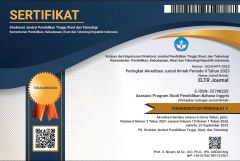CODE-SWITCHING AND SLANG USED BY GEN Z INDONESIANS ON SOCIAL MEDIA
Abstrak terlihat: 8446 / PDF terunduh: 3319DOI:
https://doi.org/10.37147/eltr.v7i1.165Keywords:
code-switching, Gen Z, slang, social mediaAbstract
Most social media active users are Gen Z Indonesians Gen Z, who usually communicate with others on social media by switching their code to another code or language and using slang. The switchover from Bahasa Indonesia to other regional dialects or English and the use of slang have been dominated on social media, not limited to words but also sentences. This study observes and examines the reasons that underlying Indonesians Gen Z perform code-switching and use slang, as well as the advantages and disadvantages that will arise. The research method used is descriptive qualitative research. Data were collected from journals, reports, or books that had been written by other researchers and analyzed by content or document analysis and discourse analysis. This research found that there are some reasons, such as social reasons, convenience, referential functions like emphasizing the precise message, and affective functions, also there are three advantages and a disadvantage of code-switching and using slang in communication in social media.
Downloads
References
Al-Ani, A., & Ibrahim, H.A. (2015). A study of code-switching among EFL learners. Retrieved from: https://www.researchgate.net/publication/309419008_A_Study_of_Code_Switching_among_EFL_Learners.
Amir, K., & Azisah, S. (2017). Gender analysis on slang language in students’ daily conversation. ETERNAL (English, Teaching, Learning, and Research Journal), 3(2), 229-243. https://doi.org/10.24252/Eternal.V32.2017.A10
Appel, G., Grewal, L., Hadi, R., & Stephen, A. T. (2020). The future of social media in marketing. Journal of the Academy of Marketing Science, 48(1), 79-95. https://doi.org/10.1007/s11747-019-00695-1
Ariasih, N. P. L., Jendra, I. M. I. I., & Sulatra, I. K. (2021). Types of code switching found in the twitters of the Indonesian kpop fans. Journal of Language and Applied Linguistics, 2(2), 96-108. https://doi.org/10.22334/traverse.v2i2.36.
Ary, D., Jacobs, L.C., Sorensen, C., & Razavieh, A. (2010). Introduction to research in education (8th Ed.). Belmont: Wadsworth Cengage Learning.
Astuti, C. W. (2020). Language awareness: Language use and reasons for code-switching. LLT Journal: A Journal on Language and Language Teaching, 23(1), 116-130. https://doi.org/10.24071/llt.v23i1.2477
Bin, X., & Mimi, L. (2014). A sociopragmatic analysis of Chinese-English codeswitching in advertising discourse. https://doi.org/10.24308/iass-2014-156
Budiasa, I., Savitri, P. W., Dewi, S.S.A.A.Sg. (2021). Slang language in Indonesian social media. Lingual: Journal Of Language And Culture, 11(1), 1-5. https://doi.org/10.24843/LJLC.2021.v11.i01.p06.
Chen, L. (2006). An Introduction to Linguistics. Jilin: Jilin University Press.
Dai, W., & He, Z. (2010). A new concise course in linguistics for students of English (2nd ed.). Shanghai: Shanghai Foreign Language Education Press.
Dewi, H. C. (2021). Code switching used by Indonesian celebrities in social media. Deiksis, 13(3), 222-230.
Finegan, E. (2008). Language: Its structures and use (5th ed.). Boston, MA: Wadsworth.
Gonulal, T. (2019). The use of Instagram as a mobile-assisted language learning tool. Contemporary Educational Technology, 10(3), 309-323.
Gumperz, J.J. (1982). Discourse strategies. Cambridge: Cambridge University Press.
Herman & Rajagukguk, J. (2019). An English oblique translation analysis of “Twitter” social networking website into Indonesian: An applied linguistics study. International and Public Affairs, 3(1), 6-12. https://doi.org/10.11648/j.ipa.20190301.12.
Holmes, J. (2008). An introduction to sociolinguistics (3rd ed.). Harlow: Pearson Education Ltd.
Holmes, J., & Wilson, N. (2017). An introduction to sociolinguistics. London: Routledge.
Hutajulu, L.S.F., & Herman. (2019). Analysis of illucutionary act in the movie “You are my home” English subtitle. Journal of English Educational Study, 2(1), 29-36.
Jendra, I. M. I. (2010). Sociolinguistics: The study of societies’ language. Yogyakarta: Graha Ilmu.
Maulidiya, R., Wijaya, S. E., Mauren, C., Adha, T. P., & Pandin, M. G. R. (2021, December 29). Language development of slang in the younger generation in the digital era. Preprints. https://doi.org/10.31219/osf.io/xs7kd.
Nelissen, E. (2018, April 12). How digital media is changing the way we talk. Retrieved from https://blog.degruyter.com/digital-media-changing-way-talk/
Press-Reynolds, K. (2021, November 1). Facebook wants to attract young people, but Gen Z teens say it's a 'boomer social network' made for 'old people'. Insider. Retrieved from https://www.insider.com/facebook-gen-z-teens-boomer-social-network-leaks-2021-10.
Rizkyna, P. C., Nisa, M. D. K., Aulia, A. N., & Pandin, M. G. R. (2021, December 30). Analysis of mixed Indonesian language with other languages on social media. Preprints. https://doi.org/10.31219/osf.io/6pu35.
Saputra, A. (2019). Survei penggunaan media sosial di kalangan mahasiswa Kota Padang menggunakan teori uses and gratifications. Jurnal Dokumentasi Dan Informasi, 40(2), 207-216. https://doi.org/10.14203/j.baca.v40i2.476.
Septiani, M., Petrus, I., & Yunus, M. (2018, November). The use of code-switching in social media (line) by alumni of SMAN Sumatera Selatan. Sriwijaya University Learning and Education International Conference, 3(1), 725-736.
Setiawan, D. (2016). English code switching in Indonesian language. Universal Journal of Educational Research, 4(7), 1545-1552. https://doi.org/10.13189/ujer.2016.040707.
Silaban, S., & Marpaung, T. I. (2020). An analysis of code-mixing and code-switching used by Indonesia Lawyers Club on TV One. Journal of English Teaching as a Foreign Language, 6(3), 1-17.
Tarihoran, N., Fachriyah, E., Tressyalina, T., & Sumirat, I. R. (2022). The impact of social media on the use of code mixing by generation Z. International Journal of Interactive Mobile Technologies (iJIM), 16(07), 54–69. https://doi.org/10.3991/ijim.v16i07.27659.
Trimastuti, W. (2017). An analysis of slang words used in social media. Jurnal Dimensi Pendidikan dan Pembelajaran, 5(2), 64-68. https://doi.org/10.24269/dpp.v5i2.497.
Ulya, C., Rohmadi, M., Putri, U. R., Wulansari, K., & Sudaryanto, M. (2021, May). Jawanesia and Javenglish phenomenon in tweet on twitter social media. MICOSS 2020: Proceedings of the 1st MICOSS Mercu Buana International Conference on Social Sciences, MICOSS 2020, September 28-29, 2020, Jakarta, Indonesia (p. 367). European Alliance for Innovation.
Wardhaugh, R. (2010). An introduction to sociolinguistics (6th ed.). Hoboken, NJ: Blackwell publishing.
Wijanti, W. (2014). Bahasa Indonesia/English code switching. In International Conference on Economics, Education and Humanities (ICEEH’14) (pp. 101-104).
Wijayanti, S. H., & Sihotang, K. (2021). How Indonesian millennial generations communicate on social media. Review of International Geographical Education Online, 11(8), 1337-1350.
Zhou, Y., & Fan, Y. (2013). A sociolinguistic study of American slang. Theory and Practice in Language Studies, 3, 2209-2213.
Downloads
Published
How to Cite
Issue
Section
License
Copyright (c) 2022 Aprilia Bernike Kandiawan

This work is licensed under a Creative Commons Attribution-ShareAlike 4.0 International License.











 ELTR Journal,
ELTR Journal, 